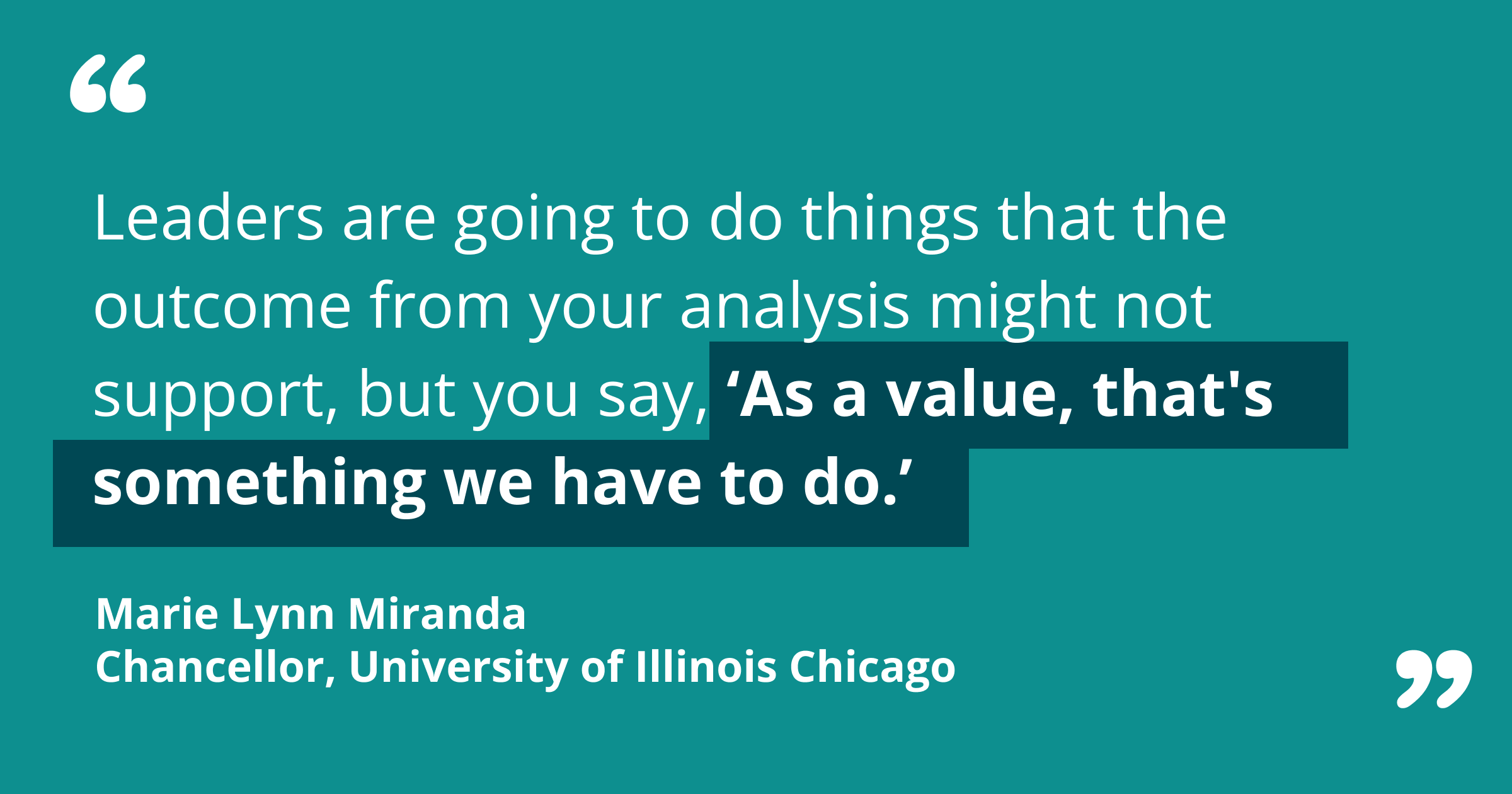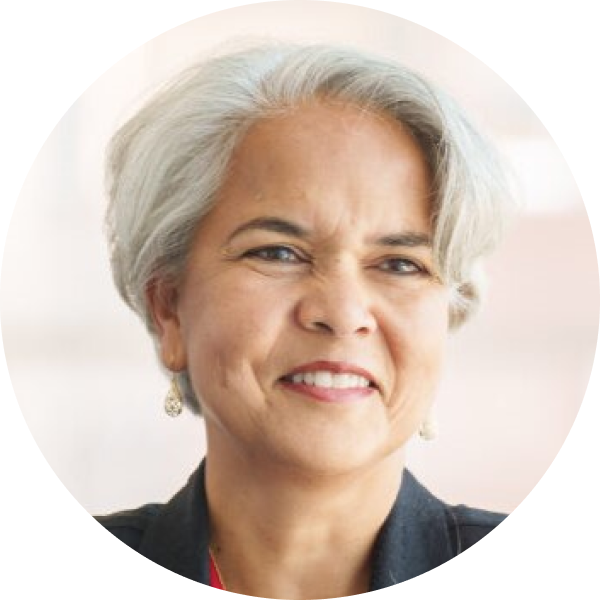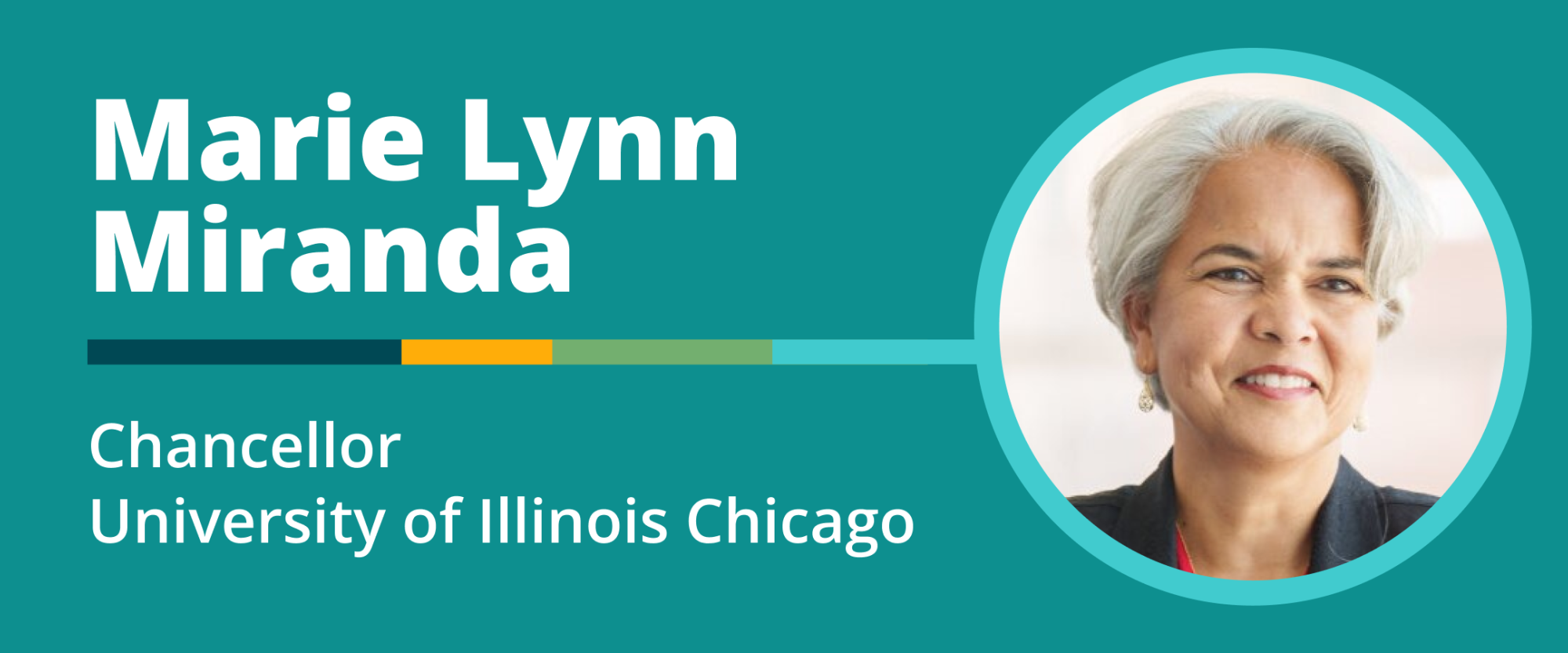The University of Illinois Chicago (UIC) is one of the University Innovation Alliance’s (UIA) prominent member institutions. When we last featured UIC on the Innovating Together Podcast, our guest was Interim Chancellor Javier Reyes. Since then, Dr. Marie Lynn Miranda has assumed the leadership role. As part of the Weekly Wisdom series, we sat down with Chancellor Miranda to talk about attentive leadership, the central role of values, building community, strategies for handling a crisis, and tracking overall objectives and key goals.
Leadership Means Paying Attention
We began by asking Chancellor Miranda to identify her leadership style:
“I’m an analytical, values-driven, servant leader, most interested in what we make possible for our community – our faculty, staff, and most importantly our students. Also, at our university in the heart of Chicago, what we can make possible for the surrounding communities? That's part of UIC's mission.
“I'm naturally introverted, and one product of introversion is observing people all the time no matter where I am. We can learn things about leadership from everybody that we're interacting with, all kinds of people leading, following, and walking alongside in every moment of our lives. If you're careful in the way that you pay attention, you can learn a lot every day.”
She described her primary leadership role model:
“I became a dean at the University of Michigan while Mary Sue Coleman was the president. I'd been leading a big research group, but for someone new to academic leadership, having her as president was incredible. I learned a lot from her, and I continue to learn a lot from her. She's my unofficial executive coach."
Values-Based Higher Ed Budgeting
Chancellor Miranda credited her skills as a quantitative scientist in running a university:
“If you have some facility with numbers and analysis, that helps. It's easy to get buried in the middle of all that data coming at you. You spend a lot of time figuring out how to distill relevant information. I'm a data-driven decision-maker, but you also have to ask, ‘What are the values of my institution?’ And you're going to do some things that the outcome from your analysis might not support, but you say, ‘As a value, that's something we have to do.’

“People think, ‘Budgets are all about numbers,’ but budgets are actually all about values. The mathematics of budgeting isn't particularly complicated. What's complicated is how budget decisions match the values and priorities that we've espoused for the university. I bring my analytical brain to the table for the decision making, but I try never to let my analytical brain silence this institution’s values.”
(Re)Building Institutional Community
Chancellor Miranda explained how the most engaged leaders approach everything about their institution with genuine curiosity:
“As chancellor, you can learn about every nook and cranny of the university. Nobody can tell you, ‘That's not in your purview,’ because it’s all in your purview. When you're exploring all these areas and physically going to where people work, their labs, classrooms, or the things they're doing out in the community, and you're asking them questions, I think most human beings are good at sensing your sincerity.
“I started at UIC in July 2023, but preceding that, I spent six months on campus. I did a deep dive with every college and vice chancellor area. People knew that I wanted to hear from them. I posed questions in advance, and they could organize however they wanted to answer and use their creativity to answer questions they thought I should have asked. And I realized that even though it was 2023, we were still coming out of COVID, when everybody saw each other in boxes in two dimensions. Anybody new to the university from 2020 forward hadn't been in rooms with all these people. We needed to be reminded that we like each other, that we have a shared mission to provide the broadest access to the highest levels of educational research and clinical excellence. And people here resonate with our mission. In fact, in the exit interview for our re-accreditation, they noted that the extent to which the mission is held across the university is extraordinary. That was the greatest asset at my disposal as a leader – that people felt our shared mission deeply, and that I could provide opportunities for us to come together.
“Shortly after I arrived, we did ice cream socials with university leaders scooping ice cream, serving the faculty, staff, and students. We're about to do hot chocolate socials, literally serving all the people in the university. We also do Spark Talks, three-minute talks from faculty about their teaching, community engagement, or research. We do 18 of them in an hour. And people realize, ‘I'm interested in this work that this person who I've never met before is doing; maybe I should have coffee with them.’ We needed a lot of community building to bring people fully back to campus. I don't think that work is completed yet, but we’re certainly much further along.”
Leadership During Crisis
Chancellor Miranda shared a vivid experience from her time as provost at Rice University:
“When Hurricane Harvey hit Houston, our president was out of the country. I was the number two. We got about 50 inches of rain, and roads were flooded. The first thing I did was to say, ‘We have to stand up a tool right now to figure out if everybody in our community is okay.’ Getting to all the students on campus was easy through the dormitories. We had them answer seven basic human needs questions on their phone or laptop. ‘Do you have a safe place to stay? Do you have power? Do you have clean water?’
“But a lot of our hourly workers didn't check their email, so we needed a mechanism for reaching them. We called the emergency number for all the people who had not responded over the internet. We had bilingual people staff the phone banks because we had a lot of bilingual hourly workers. Pretty quickly, we had a sense of what was going on for everybody in our community, and we were able to design our interventions.
“For people who couldn't move back into their houses, we set up a matching system with people with a spare room. Not a single person in our community spent a single night in an emergency shelter. We set up carpooling for people who had lost their vehicles in the flood. Schools were closed for three weeks, so we set up emergency approaches to childcare. Volunteer staff and student crews helped people with damaged homes. I went out on these crews myself. That's another thing about leadership: never ever ask people to do something that you're not willing to do yourself. And the next step was a volunteer matching system for our faculty, staff, and especially students eager to be helpful to the larger Houston community. Again, IT-based. That data science stuff comes in handy.”
Leadership Advice
Addressing Weekly Wisdom’s popular question about leadership advice, Chancellor Miranda shared one more thing about emergencies:
“I always tell people the first thing you do when an emergency arises is stop, take a deep breath, remember what your values are – your personal and your institutional values – and center yourself around that. And then start thinking about how you're going to deal with the emergency. You got to do that pretty quickly, but nevertheless, think about your values first.”
She added that the best advice she received early in her leadership journey came from Duke University’s then-president Nan Keohane:
“She told me the busier she got, the more adamant she was about her physical fitness routine, and I agree. It has really helped me all these years to keep myself physically ready for the challenges the world brings.”
When it comes to advice for aspiring leaders, Chancellor Miranda prefers to ask questions instead:
“‘Why are you interested in a leadership role? What do you want to accomplish with that? What parts of it do you feel better or less prepared for?’ I'm more likely to help them work their way through things rather than give advice.”
Recommended Reading: Accomplishments and Objectives
We also ask our podcast guests to recommend books relevant to leadership. Chancellor Miranda gave us two:
“I read a lot of biographies. I just finished Tony Fauci’s On Call, about growing up in his family, going through medical school, his time at the NIH, and all the things that he's been involved in. With autobiographies, you can almost hear the things they wish they had done a bit differently and things they're happy they did in that particular way. And you can draw parallels to the work and the questions that you yourself have to face.
“A book that I recommend a lot is John Doerr’s Measure What Matters. It's about knowing your overall objective and key goals. And for each goal, what metrics will you hold yourself accountable against? What are your milestones for meeting those metrics? It’s important to have the big vision of ‘Here's where we want to be ten years from now,’ but you also need the ability to say, ‘Where do we need to be in a month, three months, six months, a year, five years?’ To have that sense and some structure around that process of making significant progress against a big goal, I think is pretty helpful.”
Note: This interview in the Weekly Wisdom Series originally aired on November 27, 2024 as part of the University Innovation Alliance’s Innovating Together Podcast, appearing live on YouTube, Facebook, Twitter, and LinkedIn.
Resources Mentioned in This Episode
-
Servant Leadership and Empowerment: A Conversation With Alexander Cartwright, University of Central Florida President: related podcast episode
-
On Call: A Doctor's Journey in Public Service by Anthony Fauci, M.D.
-
Measure What Matters: How Google, Bono, and the Gates Foundation Rock the World with OKRs by John Doerr
Bios of Guest and Co-Hosts

In July 2023, Marie Lynn Miranda became the University of Illinois Chicago’s tenth chancellor. A nationally renowned leader in higher education and geospatial health informatics, she remains a faculty member in UIC’s Department of Pediatrics and the Department of Mathematics, Statistics, and Computer Science. Chancellor Miranda has introduced five strategic priorities for the university: reaffirming commitment to student success; expanding UIC’s research profile; engaging with the region’s communities to focus on educational and health equity; forging productive partnerships across all sectors to create faculty and student opportunities; and elevating UIC as a destination to recruit and retain world-class faculty and staff. Chancellor Miranda is also director of the Children’s Environmental Health Initiative (CEHI), serves on the Board of the Chicagoland Chamber of Commerce, and is a member of the Economic Club of Chicago and The Chicago Network. Her national board memberships include the Doris Duke Foundation, the Environmental Defense Fund, the National Institute for Nursing Research, the Board on Environmental Studies and Toxicology, and the Executive Committee of the Board of Hispanic Serving Research Universities. Before joining UIC, Dr. Miranda served as provost at Notre Dame and Rice Universities, and as dean at University of Michigan’s school of natural resources and environment. Prior to her administrative career, she was a faculty member for 21 years at Duke University, where she earned a bachelor’s in mathematics and economics before attending Harvard University for her master’s and PhD. She is also a fellow of the American Association for the Advancement of Science. Chancellor Miranda and her husband, Christopher Geron, are the proud parents of three children, two English Setters, and roughly 500,000 honeybees.

Co-Host: Bridget Burns, Executive Director, University Innovation Alliance
Dr. Bridget Burns is the founding Executive Director of the University Innovation Alliance (UIA). For the past decade, she has advised university presidents, system chancellors, and state and federal policy leaders on strategies to expand access to higher education, address costs, and promote completion for students of all backgrounds. The UIA was developed during Bridget’s tenure as an American Council on Education (ACE) Fellowship at Arizona State University. She held multiple roles within the Oregon University System, including serving as Chief of Staff and Senior Policy Advisor, where she won the national award for innovation in higher education government relations. She was a National Associate for the National Center for Public Policy and Higher Education, and has served on several statewide governing boards including ones governing higher education institutions, financial aid policy, and policy areas impacting children and families.

Co-Host: Doug Lederman, Editor and Co-Founder, Inside Higher Ed
Doug Lederman is editor and co-founder of Inside Higher Ed. With Scott Jaschik, he leads the site's editorial operations, overseeing news content, opinion pieces, career advice, blogs and other features. Doug speaks widely about higher education, including on C-Span and National Public Radio and at meetings and on campuses around the country. His work has appeared in The New York Times and USA Today, among other publications. Doug was managing editor of The Chronicle of Higher Education from 1999 to 2003, after working at The Chronicle since 1986 in a variety of roles. He has won three National Awards for Education Reporting from the Education Writers Association, including one for a 2009 series of Inside Higher Ed articles on college rankings. He began his career as a news clerk at The New York Times. He grew up in Shaker Heights, Ohio, and graduated in 1984 from Princeton University. Doug and his wife, Kate Scharff, live in Bethesda, MD.
About Weekly Wisdom
Weekly Wisdom is an event series that happens live on Facebook, Twitter, and LinkedIn. It also becomes a podcast episode. Every week, we join forces with Inside Higher Ed and talk with a sitting college president or chancellor about how they're specifically navigating the challenges of this moment. These conversations will be filled with practicable things you can do right now by unpacking how and why college leaders are making decisions within higher education. Hopefully, these episodes will also leave you with a sense of optimism and a bit of inspiration.
Rate, Review & Subscribe
Learn why hundreds of people have rated this new podcast 5 stars! Please join others and rate and review this podcast. This helps us reach and inform more people -- like you -- to help increase the number and diversity of college graduates in the United States.
Click here, scroll to the bottom, tap to rate with five stars, and select “Write a Review.” Then be sure to let us know what you loved most about the episode! Also, if you haven’t done so already, subscribe to the podcast. We’ll be adding a bunch of bonus episodes to the feed and, if you’re not subscribed, there’s a good chance you’ll miss out.

